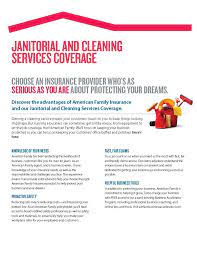- Commercial Cleaning Insurance may well be your main insurance product. You might discover that a commercial cleaning company can be costly to start up, with monthly and yearly fees. A number of these businesses are also relatively large, with different employees. When you add the costs of materials, equipment, labour and special training, you will likely soon discover that it is easier to lose your mind than to earn money with your commercial cleaning business.
Four Things to Consider When Purchasing Commercial Cleaning Insurance
If you possess a commercial cleaning company and wish to insure it, you’ll probably want to get a commercial general liability coverage. Such policies typically cover property damage, theft, bodily harm and public nuisance. However, there are some policies that specifically exclude coverage for cleaning, janitorial services or construction activities. In case your commercial cleaning company does a lot of work for offices or government buildings, you ought to find extra protection, which can cost you more.
Four Things to Consider When Purchasing Commercial Cleaning Insurance
If your commercial general liability insurance policy does not pay you for property damage, how can you get property damage policy? If you’re renting office space, it is possible to take out tenants’ insurance. This will pay for property damage that occurs to a tenant’s personal property. Take note, however, that this policy does not cover any damages caused by your company operations. So even if your janitorial service triggers a traffic accident, your tenant won’t be insured.
Four Things to Consider When Purchasing Commercial Cleaning Insurance
A commercial cleaning insurance plan may also have liability policy. Some policies don’t, but this is because liability lawsuits are so common in commercial business. Contractors can result in serious injuries at work. If they don’t have appropriate liability insurance, a contractor may be prosecuted for medical bills, pain and suffering, and so on. That means you should locate this policy included in your policy if you want your janitors and cleaners to have complete protection.
One factor that can change your commercial cleaning businesses’ commercial insurance cost is the positioning of your small business. If your business is near a hospital, a nursing home, or other associations, you’ll need to spend more on premiums. The reason is that these companies are more likely to be at risk of accidents. Also, if you supply employees with free health and dental benefits, you will be able to lessen your commercial cleaning business insurance cost.
Along with the location of your company, there are several other elements which will affect your business liability insurance plan. One of these factors is if your workers have liability coverage. It will be cheaper to include on a janitorial insurance plan to your overall liability insurance program. But you should check with your insurance company to learn what the difference between a general and liability insurance plan is to your particular sort of business.
You might also need to think about including property damage coverage in your insurance plan. Property damage is among the most common claims made against cleaning services. This means that if your cleaning companies cause harm to another person’s personal property or into your company’s property, you could be held responsible for that amount. Property damage insurance covers damage to property, such as office buildings, stores, warehouses, or other comparable areas. Some property damage policies also cover damage due to your cleaning services to another individual’s vehicle or to the care they received while within your facility.
Finally, you need to always contain medical expenses policy in your house cleaning insurance plan. Many cleaning companies deliver low-level services, such as house cleaning and window cleaning. Nonetheless, these services often require specialized equipment and other things which you can not have purchased with your regular home cleaning supplies. Consequently, if one of your clients suffers an accident while at your place of business, you could be held legally accountable. This could result in monetary losses for the organization and your client.

